New Orleans Easter
BOB ABERNETHY, anchor: Now, looking for signs of resurrection in the aftermath of Hurricane Katrina. Many residents along the Gulf Coast still feel neglected by local, state, and national politicians. Often, it’s the faith-based institutions that are providing the majority of physical and social support with local pastors doing heroic work.
Kim Lawton returned to New Orleans and followed two pastors who say they are seeing new meanings this year in traditional Holy Week themes.
Reverend LANCE EDEN (First Street United Methodist Church, preaching): Jesus said, “I am the Resurrection and the Life.”
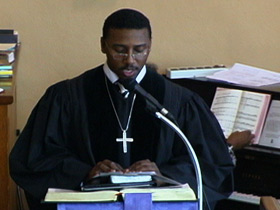
KIM LAWTON: Lance Eden hasn’t even been a pastor a full year, and he’s already presided over a dozen funerals. That’s a lot for a pastor with a congregation of less than a hundred. But in New Orleans, death and destruction have become all too familiar.
Rev. EDEN (preaching): May God grant us grace that in pain we may find comfort, and in sorrow, hope; in death, resurrection.
LAWTON: Eden says after Katrina Good Friday resonates in new ways.
Rev. EDEN: Being able to understand on Good Friday how Jesus suffered and, understanding our suffering, knowing that if Jesus suffered and we’re followers of Christ, there’s going to be some suffering we’re going to face.
Reverend JERRY KRAMER (Episcopal Church of the Annunciation, praying): The Lord be with you.
LAWTON: Across town, another first year pastor, Jerry Kramer, also says the aftermath of Katrina looms large over Easter this year.
Rev. KRAMER: We are people who are, you know, standing at the foot of the cross, really. We’ve been in Good Friday since late August. We live in both the reality of the cross but also the reality of resurrection, and we are caught in that tension.
LAWTON: Easter can be a busy and stressful time for pastors. Kramer and Eden say clergy on the Gulf Coast feel especially burdened, balancing their regular pastoral duties while dealing with their own losses, and ministering to congregations that are still trying to recover from the storm.
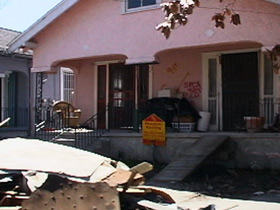
Twenty-seven- year-old Lance Eden came to First Street United Methodist Church in June, a brand new seminary graduate. He grew up near New Orleans and was thrilled to be coming home. First Street is one of the oldest African-American churches in the city, founded in 1833. In recent years, the church had been experiencing a decline.
Rev. EDEN: I think they just needed a rebirth, something new, a young person to come in, ignite that fire.
LAWTON: He says by August the church was already feeling a new momentum and adding new members. Then Katrina hit. The historic church building sustained only minor damage, but the congregation scattered. Many members still have not been able to return. Because the church couldn’t afford a parsonage, Eden, who’s single, was living with his grandmother, about a half-hour’s drive away from the church.
Rev. EDEN: We lost everything, everything — everything from cars to, you know, your personal items. There were a few suits that I was able to salvage, and pictures. It was described as like losing a loved one but not being able to bury them. And you’re just stuck with that loss and having to deal with it every day.
LAWTON: Members from a United Methodist church in Minnesota donated an RV that Eden, his father and his grandmother now share. But more often than not, Eden just sleeps on a cot in his church office.
Rev. EDEN: I can relate to where the people are and where they’ve been.
Rev. KRAMER: It’s amazing. It’s seven months and look at it still.
LAWTON: Jerry Kramer, rector of the Episcopal Church of the Annunciation, says he too can relate. He and his family moved to New Orleans last January after being missionaries in Africa.
Rev. KRAMER: We bought this great old house in April. We moved in in June, and we were in the process of renovating it when we had to evacuate on August 27.
LAWTON: A week later, he boated in.
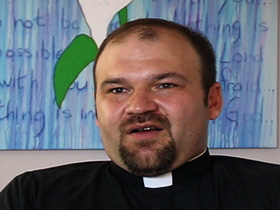
Rev. KRAMER: When I paddled the boat in from St. Charles, the water was anywhere from 5 to 8 feet.
LAWTON: He was able to rescue his kids’ pet hamster, but few possessions.
Rev. KRAMER: It was the things you can’t replace, like our family albums, my great grandmother’s hand-written cookbook.
LAWTON: For now, his family is living in a tiny apartment about a half-hour away from the church.
Rev. KRAMER: We have to pay the mortgage on our house. We don’t have our tenant anymore, and the mortgage was predicated on having the tenant. And then we have to pay for an apartment at an exorbitant rate. And at the end of the month, it doesn’t work.
LAWTON: And he’s dealing with the same issues at his church, where floodwaters rose halfway up the front door.
Rev. KRAMER: And then I stood here, and I was ankle deep in water at this point. And I could see the pews were bobbing, floating — prayer books, Bibles.
LAWTON: While the insurance is being sorted out, the church has brought in double-wide trailers, which serve as offices, sanctuary and multipurpose rooms.
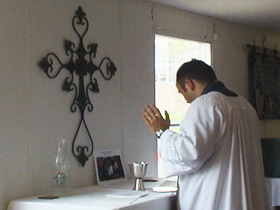
Rev. KRAMER (to volunteer): Everybody at the diocese knows that I don’t turn down food — or bleach or water.
LAWTON: Annunciation still has an active relief effort, passing out supplies.
Rev. KRAMER (praying at table with parishioners): We pray for our Broadmoor Association, for wisdom and strength…
LAWTON: About half of the 100 parishioners have returned. Kramer says ministering to them is a huge pastoral challenge.
Rev. KRAMER: You know, it’s so hard to go through life without any givens, particularly in the most important aspects of your life: where you live, where you work, where you worship, where your kids go to school, where you get medical care. There are just no answers, and there aren’t going to be any anytime soon.
LAWTON: He also tries to still minister to people like Dottie and Bill Simmons, who ended up in a FEMA trailer more than an hour away from the church. He’s been wearing a lot of different hats since the storm.
Rev. KRAMER: I’ve got to be teacher — I mean, we are still doing our adult education and Bible study. I’ve got to be community activist, working with our neighborhood people. I have to be relief worker, you know, out there in the streets with our crew. I have to be counselor. I have be priest and pastor
LAWTON: And church secretary, folding the Sunday bulletins.
Rev. KRAMER: One done, 60 more to go.
LAWTON: He’s also become a tour guide, showing volunteers the extensive hurricane damage, and master fundraiser, often on the road and in the air, visiting other churches.
Rev. KRAMER: Making connections with other parishes and congregations, sharing our story, and seeking their generosity to help us weather this.
UNIDENTIFIED WOMAN (at meeting): They have bent over backwards for our community.
LAWTON: The church is forging new partnerships with the neighborhood in the efforts to rebuild. Kramer says they’re trying to make the most of new opportunities to have an impact on this diverse community.
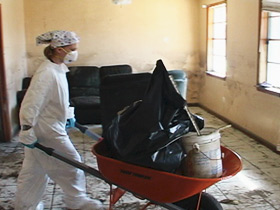
Rev. KRAMER: What’s God calling us to be in this new environment, this new landscape, which is a great big mission field?
LAWTON: Kramer says he tries to maintain a disciplined prayer life so he doesn’t spiritually burn out. But he says his ministry is also energizing.
Rev. KRAMER: An old spiritual director told me I had a very Jesuit spirituality. I was a doer. You know, I’m fed by doing. And there is plenty to do.
LAWTON: Lance Eden can find himself being a traffic cop dealing with parking problems in front of the church. But much of his time is taken up as volunteer coordinator. The First Street multipurpose room has been transformed into a giant dorm room. The church feeds and houses up to 100 volunteers every week, with Eden supervising where they go and what they do.
Rev. EDEN: Some of the volunteers who’ve been here awhile, I hear a couple of them getting a little snappy, and I say, “Oh, you all need a little break.”
LAWTON: Their crews can gut a house in a day.
Rev. KRAMER: It’s an ever-going process. The problem is the government is not doing it. The city’s not doing it. The only organized group that’s doing it is the churches.
LAWTON: Eden says First Street is doing what it can, given an uncertain financial situation.
In the midst of it all, Eden admits he rarely slows down.
Rev. EDEN: Everybody asks me, “How do you do it?” But I just love — I just really love what I’m doing. I just love working for the church. The church has been my life from childhood. It was the center of the community. So being here is not always so stressful to me.
LAWTON: He says he finds spiritual refreshment listening to Gospel music in his car.
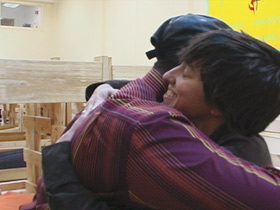
Rev. EDEN: My head is bopping. You would think I was one of the hip-hoppers with other music going. But Gospel music inspires me in a way that no other music does. And I listen to other music, but there’s something about the inspiration. It just lifts you up.
LAWTON: He says his 84-year-old grandmother also helps center him spiritually. On this day, he has taken her to visit the family cemetery for the first time since the storm. The graves there were ravaged. His great-grandmother’s casket was found just this past week. Eden says it helps him understand the feeling of being between Good Friday and Resurrection Sunday.
Rev. EDEN: We’re that Saturday — that day that those old preachers say Jesus went down to the gates of Hell and took the keys, and everybody was waiting on what was to happen next. We’re in that waiting moment, to see what’s going to happen.
LAWTON: He sees resurrection, he says, in daily miracles around him — volunteers who have come to help, people who are surviving despite the circumstances.
Rev. EDEN: We get the testimonies of persons saying, “Hey, someone took me in, someone gave me this. I have more than I had before the storm, pastor.” And you get these stories, and I say, “Hey, look at God. God provided.” So the persons I look at and I see everyday, I say, “You’re still here.” Now that’s a blessing in itself.
LAWTON: Jerry Kramer calls it finding explosions of grace amid the rubble.
Rev. KRAMER: We see God’s grace. We see people being really transformed by the Holy Spirit. You can’t but walk around and see the power and the reality of the resurrection and the Kingdom coming.
LAWTON: Both pastors say that is the ultimate Easter message: that death doesn’t have the final word.
I’m Kim Lawton in New Orleans.

